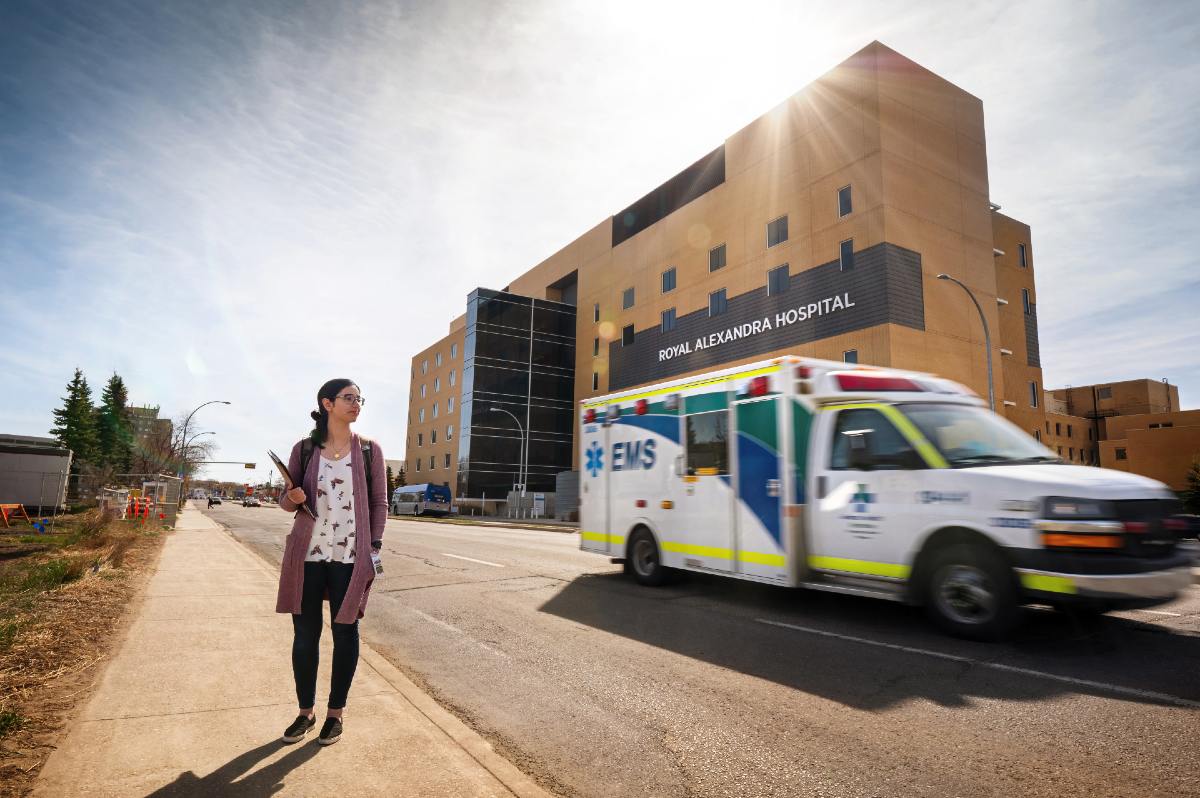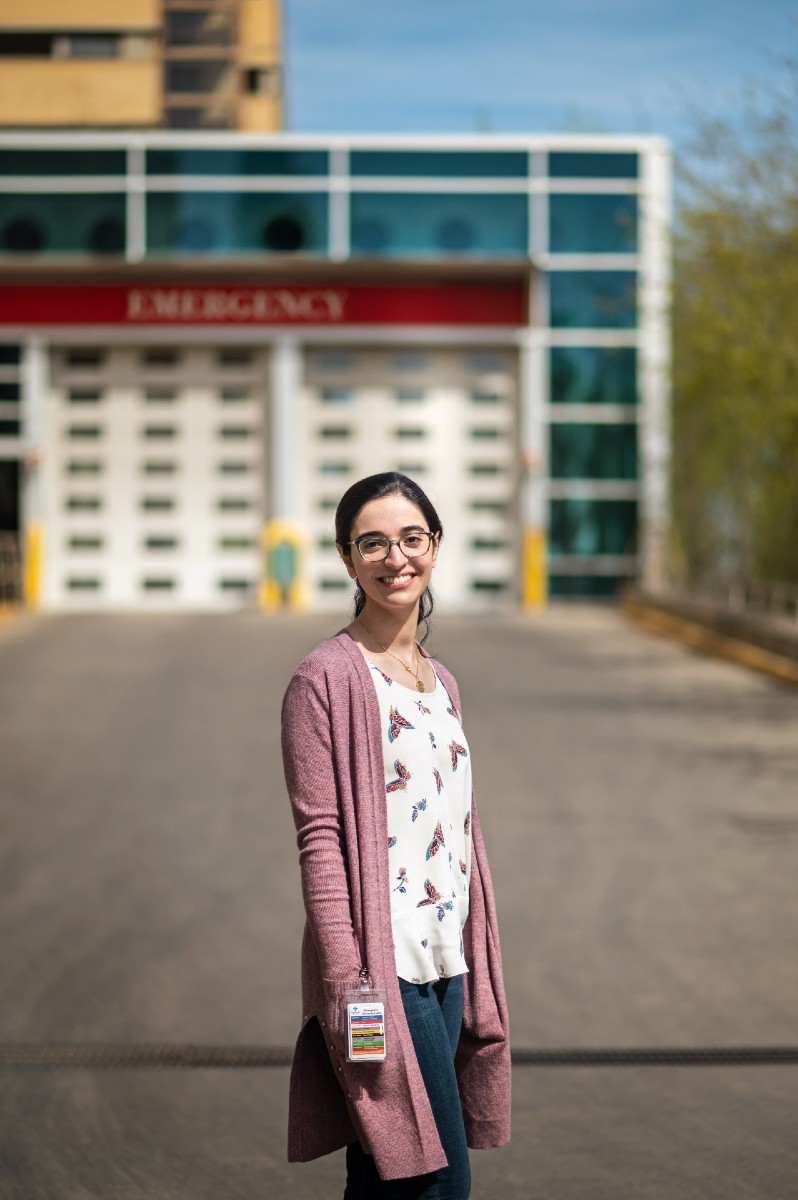Working through it
Tom Ndekezi - 8 July 2021
The COVID-19 pandemic has brought many lessons, not least of which is adaptability. The world of post-secondary education is no exception, and over the last 18 months, students have adapted to remote coursework, instructors have developed innovative ways to share course materials, and many of us learned how to work from home.
For students engaged in work-integrated learning through the Science Internship Program (SIP), the challenges of the first work placement of their scientific careers were accentuated by COVID-19—and none of those students felt them more than those in the medical field. New psychology graduate Reihaneh Abtahi (’21 BSc) faced those challenges head-on. During the first few weeks of her internship at the Royal Alexandra Hospital analyzing data from COVID-19 patients, the stakes could not have been higher.
“I remember that for the first two weeks, it was really challenging for me to work full time. I was never that busy during university,” Abtahi says. “I knew that if I entered something wrong into the data, everything would be messed up. Whenever I recorded information, I was constantly double-checking everything I did.”
Abtahi’s research was part of a national project analyzing the retrospective data of COVID-19 patients admitted to emergency wards. Her internship began in September 2020, just as the province was entering what would eventually become the pandemic’s second wave. There in the Royal Alexandra’s medical records room, Abtahi was watching the numbers climb.
“It was really hard to keep up, and honestly, we couldn't,” she says. “We couldn't keep up or always be on time entering data from the charts into the computer because the workload and pace of incoming cases was unbelievable.”
If the classroom was the frying pan, this was definitely the fire. But it was also an up-close look into a medical field that Abtahi has been intent on for most of her life, and an opportunity that came about thanks to the SIP.
Learning on the job
Born in Iran, Abtahi’s family emigrated to Edmonton in 2012. Her focus has been on becoming a doctor for as long as she can remember—“My interest was always medicine,” she explains—but it was the internship program that persuaded her to set her sights on the University of Alberta.
“I decided to go to the U of A specifically because of this internship program,” she says. “Some staff from the U of A came to my high school and told us about the SIP program, where you can take up to 16 months out of class to go experience real-life jobs and situations.”
Like many undergraduates, Abtahi found the first few years out of high school were a bit of a rude awakening.
“University was really a different experience than I had expected,” she says.
There was also the pressure to build a resumé that could meet the demands of medical school admissions officers. Abtahi quickly amassed volunteer hours working in hospitals, but she soon found herself drawn to extracurriculars for reasons that went beyond getting into medical school. “I began looking for extracurriculars because of med school, and at some point I realized I had enough to put on my resumé,” she says. “But I wanted more. I wanted to join other groups. At some point, I realized that it's not just about studying medicine.”
That meant continuing to volunteer at hospitals and as an undergraduate mentor with the Faculty of Science, but also joining the Artificial Intelligence in Medicine Student Society (AIMSS) as its vice-president communications.
Keeping up the good work
Ultimately, Abtahi still had her sights on the Science Internship Program that attracted her to the University of Alberta in the first place. The SIP allows Faculty of Science undergraduate students to integrate work experience into their degree in four-month work periods, up to a maximum of 16 months. It’s on-the-job training that helps students develop hands-on skills, while engaging with research opportunities that supplement their classroom learning—an invaluable opportunity when it comes time to take that next step into the workforce or graduate studies.
After a year of searching for an internship, Abtahi found a research assistant position at the Royal Alexandra Hospital for the Fall 2020 semester. While the focus of the placement was outside of her psychology major, Abtahi was excited by the idea of gaining experience in another field—namely health data analysis. She was supervised by two doctors at the hospital, and with the help of a few nurses who were assigned to the project alongside her, she input and interpreted anonymized data from COVID-19 patients.
“I wouldn’t have found this internship if it weren’t for SIP and I am grateful to have gotten this experience a few years earlier than I would have expected,” says Abtahi. “To anyone considering the internship program, keep looking for the right position and don’t give up. Getting work experience in a field you love is the most valuable and unforgettable experience.”
Her unfamiliarity with medical terminology initially made for a steep learning curve, but her experience as an undergraduate student mentor had taught her the importance of never being afraid to ask questions—particularly on a project as important as this.
“During that first month, I asked lots of questions, and sometimes I felt bad,” Abtahi says. “But I realized that I shouldn't, because the accuracy I needed to have for this research project was even more critical.”
As a mentor, she advises undergraduate students to maintain a willingness to learn, no matter the feelings of uncertainty that might come with it. Many of the students are just beginning their own academic journeys. That willingness to learn is the mindset that allowed her to survive the trial by fire of working through the pandemic’s second wave, and even have her internship extended beyond its initial four-month term.
Now having finished her degree, Abtahi’s focus is still on medical school, but thanks to the work-integrated learning experience she gained during her internship placement, she feels ready for whatever her next challenge may be.
"My plan for my future kind of changed. I realized I don't want to only study until I get accepted to medical school," she says. "I had the chance to be a research assistant and learn a lot on the job. This opportunity caused me to realize that I love research more than I thought. I want to continue on this path.”

